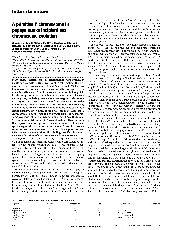摘要
Many diverse systems for sex determination have evolved in plants and animals(1-3). One involves physically distinct ( heteromorphic) sex chromosomes ( X and Y, or Z and W) that are homozygous in one sex ( usually female) and heterozygous in the other ( usually male). Sex chromosome evolution is thought to involve suppression of recombination around the sex determination genes, rendering permanently heterozygous a chromosomal region that may then accumulate deleterious recessive mutations by Muller's ratchet, and fix deleterious mutations by hitchhiking as nearby favourable mutations are selected on the Y chromosome(4,5). Over time, these processes may cause the Y chromosome to degenerate and to diverge from the X chromosome over much of its length; for example, only 5% of the human Y chromosome still shows X - Y recombination(6). Here we show that papaya contains a primitive Y chromosome, with a male-specific region that accounts for only about 10% of the chromosome but has undergone severe recombination suppression and DNA sequence degeneration. This finding provides direct evidence for the origin of sex chromosomes from autosomes.
- 出版日期2004-1-22
